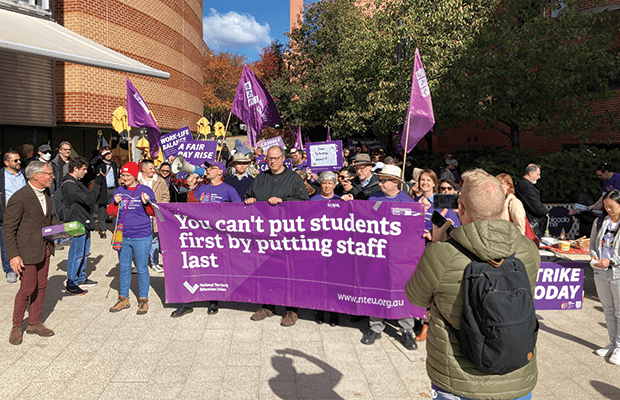The Western Sydney University (WSU) branch of the National Tertiary Education Union (NTEU) has agreed terms on a new Enterprise Agreement (EA) which will see a significant reduction in the reliance on casual labour among other improvements to pay and conditions. Staff still must vote to approve the agreement for it to be ratified.
The agreement between the Union and WSU will see the creation of 150 full-time equivalent permanent positions at the University over the next two and a half years. Casual academics currently working at WSU will be preferenced in applying for the positions. This means the amount of casual labour relied on by the University will decline by almost 25 per cent.
Staff will further receive a minimum pay rise of 4.6 per cent in 2022. While this represents less than the 5 per cent sought by the Union, professional staff on low incomes will receive a one off payment between $500 and $1000, which represents a pay increase of up to 6.4 per cent for the lowest paid staff.
The parties have agreed to a 3.35 per cent increase in pay in October 2023, 2.9 per cent increase in October 2024 and a 2.6 per cent increase in March 2025.
The NTEU has also won 20 days of Gender Affirmation Leave for staff at WSU, the demand for 30 days of Gender Affirmation Leave per year in the USyd NTEU enterprise bargaining demands.
Professional staff will further enjoy the right to work from home, and super will be payable on unpaid parental leave in another win for the Union.
NTEU NSW Secretary Damien Cahill described the agreement as “a fantastic, historic achievement for our members” while National President Alison Barnes said the agreement was a “groundbreaking win” resulting from the hard work of WSU staff.
The agreement follows a half-day NTEU strike at WSU on 8 June.
NTEU USyd Branch President Nick Riemer said that the agreement “should reset EA negotiations everywhere” and committed to “continue campaigning until Mark Scott meets his responsibilities”.
The NTEU estimates that over 160,000 workers in higher education are casual workers or on short term contracts, which constitutes approximately two thirds of the entire higher education workforce. A Senate report in 2021 found that at least 21 of Australia’s 40 universities, including the University of Sydney, have been implicated in the underpayment of casual staff to date.
WSU confirmed that they have reached an agreement which includes a “significant academic decasualisation program” with the NTEU and that the agreement included “good, well-deserved, fair improvements in conditions for staff”.
The University recorded a $143 million surplus in 2021, up from $22 million in 2020.





